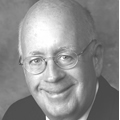Charles Bryan

President, CAB Consulting
M.S. Mathematics 1969
Board of Directors, Medical Mutual of Ohio, Board of Directors, Safe Auto, Board of Directors, Tower Insurance Group
Written by: Shannon Knapp, Ph.D. candidate in Statistics
Charles Bryan started out as a history major, "but I realized I could study history by myself, so I asked myself, 'What else am I good at?'" He was good at mathematics, which lead to a bachelor's degree in mathematics, then a master's in mathematics at Purdue. Bryan came to Purdue because, "Purdue was known as a good engineering school, so it was also good in mathematics and was big enough to offer a wide variety of courses." He found his way into actuarial science, because the only job he was offered after graduation was an actuary job in New York City. "I began my career as an actuarial analyst in charge of several states for personal auto pricing." Today he is not only the president and founder of a property-casualty insurance consulting firm, but sits on the board of directors of three major insurance companies with combined revenue in the billions of dollars.
Working as an associate actuary for Allstate in the mid-70's, Bryan "introduced a number of new rating structures, including the first new home discount in the industry," "a new conviction-based rating plan, which allowed Allstate to charge for traffic convictions," and "developed the original 30% airbag discount." After earning his MBA in 1976, Bryan moved into more executive positions, becoming Chief Financial Officer of United Services Automobile Association (USAA) in 1987. Bryan then moved to Ernst & Young where he "introduced property-casualty insurance strategic consulting at the firm [and] organized a national casualty actuarial practice," which he grew "to a record $10M in fiscal 1993." In the late '90's, Bryan lead the start-up Direct Response Corporation from two to 70 employees in a 15 month period. Bryan finished out the '90's as Senior Vice President-Chief Actuary for Nationwide Insurance, a top five insurance company.
Today, Bryan spends roughly half his time in his capacity as a member of the board of directors of three major insurance companies: Medical Mutual of Ohio, Safe Auto, and Tower Insurance Group. Bryan explains, "The primary responsibility of the board of directors is to exercise overall governance." Board members serve an oversight role, reviewing the performance of the CEO, stock performance, and financial reporting. According to Bryan, board responsibilities take more time now than five years ago due to increases in legislation and regulation that followed corporate scandals, such as the one at Enron. Last year financial reporting was the big issue. This year the big issue is compensation, due to the recent controversies over CEO compensation. As President of CAB Consulting, which he founded in 2001, Bryan's clients include a top ten insurance company, the Ohio Attorney General, and state insurance departments. Much of Bryan's time is spent giving expert testimony on insurance issues at civil trials. He also works to educate others in his field, giving seminars to departments of insurance and boards of directors.
Bryan has been active in professional societies, serving as president of the American Academy of Actuaries, and as president and elected member of the board of directors for the Casualty Actuarial Society. In addition, as Vice President of Research and Development for the Casualty Actuarial Society, Bryan developed The Actuarial Forum, a new quarterly periodical and oversaw the completion of the first Casualty Actuarial Society sponsored textbook.
According to Bryan, there is a lot of room in the actuarial field for talented people. Nine or ten exams are required, which can take five to ten years to pass. Students thinking about becoming actuaries should enjoy the mathematical part, but also enjoy working with people, and should be very persistent to pass all the exams. To prepare for success in the actuarial field, Bryan recommends students gain experience working with others on a common objective through such activities as Junior Achievement or social work. "The real skill actuaries need is the ability to work with other people," to "convince them that what you are doing makes sense."
To students preparing to transition from school to the real world, Bryan warns that in school you study textbooks which have nice answers. In contrast, when you are on the job, there are few textbook answers. You will be dealing with problems that are too complicated to fit in a textbook. The problems involve making estimates and judgment calls. In school there is one right answer. In a real job, there is no right answer; you will have some fixed deadline and will need to provide an answer with a range, based on differing values of your estimates. Furthermore, the key to success in school is being good at math and statistics, while on the job, the key to being successful is not necessarily being the smartest (and in fact that may even be damaging), but being able to work with others; being open-minded and listening to other's ideas to come up with a satisfactory answer.
Charles Bryan received the Actuarial Science Outstanding Alumni Award from Purdue University, Department of Statistics and Department of Mathematics in 2007.
Update to profile: Charles Bryan received the 2009 College of Science Distinguished Alumni Award in 2009.
To read more Alumni Profiles, please visit our Alumni Profiles archive.